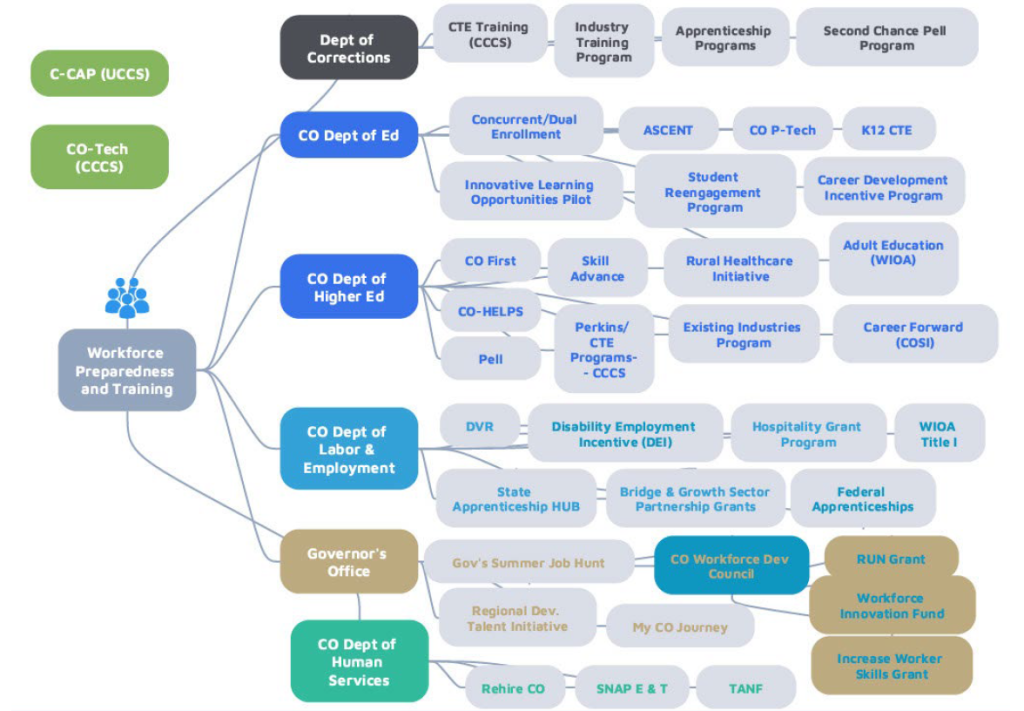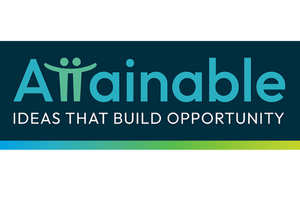State Policy, from Policy to Implementation

Colorado government’s efforts to enhance career pathways in Colorado require alignment of various agencies and programs to provide high-quality education and job opportunities. At times the complexity of this system can resemble a bowl of spaghetti. These agencies hope working together harmoniously in this “spaghetti bowl” can simplify the experience for learners to better bridge the gap in education beyond high school and address disparities among different populations within local communities.
As happens in many other states, there is an intersection between politics and administration, where policy makers draft and pass laws on what they think are good ideas and once passed, administrators work to implement what has been written into law. In general, laws are well-intentioned but can create complications and may not necessarily be good in execution. Despite this, it’s still the law and those on the ground can share feedback on what is and isn’t working to inform updates. An additional layer of complication for Colorado is that single-topic bills are required. That results in a lot of individual and sometimes disconnected programs within the same area.
Who is involved?
The Colorado Department of Education (CDE) provides leadership, resources, support and accountability to the state’s school districts, schools, teachers and administrators to help them build capacity to meet the needs of the state’s public-school students. CDE is responsible for implementing state and federal education laws, disbursing state and federal funds, holding schools and districts accountable for performance, licensing all educators and providing public transparency of performance and financial data. CDE’s Office of Postsecondary and Workforce Readiness (PWR) specifically supports schools and districts to help each Colorado high school graduate to demonstrate the knowledge and skills (competencies) needed to succeed in postsecondary settings and to advance in career pathways as lifelong learners and contributing citizens.
Colorado Department of Higher Education oversees and coordinates policy for 31 public institutions of higher education (including community colleges, independent local district colleges and local area technical colleges) under its own authority and through its board, the Colorado Commission on Higher Education, whose vision is that all Coloradans have an education beyond high school to pursue their dreams and improve our communities.
The Office of the Future of Work was created through an executive order in 2019, to understand, prepare for, and develop policy and programmatic solutions to foster an economy that works for everyone in Colorado. The OFW shapes an equitable economy of the future and ensures that Coloradans are equipped with the necessary education, training, skills, and tools to fully participate in the labor force. The OFW is based within the Department of Labor & Employment.
The Colorado Workforce Development Council (CWDC) is a Governor-appointed, public-private partnership with the purpose to advise, oversee, and integrate the work of the Colorado talent development network. The CWDC is responsible for the continuous improvement of the workforce system, oversight of Workforce Innovation and Opportunity Act (WIOA) funds, and ensuring a statewide strategic vision created from the bottom up through Council members and local partners.
The Colorado Community College System is our state’s largest higher education and workforce training provider, with 13 colleges and 35 locations offering Concurrent Enrollment, Career & Technical Education (CTE), certificate programs, transfer programs, associate and bachelor’s degree programs, one master’s degree program and customized employer training.
Colorado’s Collaborative Approach
In 2014 legislation was introduced to establish the annual Colorado Talent Pipeline Report. The development of this report brings together these various state agencies to identify areas of growing demand and opportunity, key features of the current labor force, and strategies to balance the supply and demand equation for talent. It also highlights the Top Jobs in Colorado — jobs with high annual openings, above average growth, and a good wage.
The report is presented by the CWDC in partnership with the Department of Higher Education, the Department of Education, the Department of Labor and Employment, and the Office of Economic Development and International Trade, with support from the Office of State Planning and Budgeting, the State Demography Office at the Department of Local Affairs, and other partners.
At its introduction in 2014, it was a catalyzing moment creating further opportunities to work together and strategically use education, economic, and workforce data to determine how all aspects of the education to career pipeline could be structured. As a result of that work state agencies are collaborating on specific initiatives in the K-12, postsecondary, and workforce spaces to re-examine and find opportunities to better align programs such as concurrent enrollment, ASCENT, P-TECH, TREP, CDIP, and CTE.
The State Apprenticeship Agency is leveraging apprenticeships to make high school and college connect to business and industry needs. This intensive work-based-learning program is not the solution for every talent problem, but it is certainly powerful in responding to gaps. This experiential learning approach enables learners to decide if something is right for them and helps chart a path to a relevant credential.
Stackable Credentials is the pathways approach which creates multiple ways for a student to get from Point A to Point Z and into a good job. As a starting point these apply to high need, high demand industries and have created flexible options for students to learn in K-12, CTE, Work Based Learning, postsecondary, and apprenticeships.
Currently, the 1215 Task Force is charting the next phase, rethinking how high school, higher education, and work-based learning can be better integrated, or “blurred”, for the state to improve postsecondary workforce readiness. The Task Force is forcing a public conversation about the role of high school and what career-connected opportunities every single student in Colorado should have access to. The recommendation report will come by the end of this year, but execution will take years to fully implement.
Right now, the various agencies have a full docket for the 2024 Legislative Session but there’s plenty of work that can be done. Where there’s an idea and concept, the agencies can be a sounding board to ensure it’s not something that an agency would likely oppose, give suggestions on what to adjust so that when something does come to the legislative session it can move faster.
With a multitude of agencies and organizations, it can be confusing to know who or where the “right” place is to start. Just remember, we’re all in the big bowl of spaghetti together and we will work together to get you to the right person.
RECENT ARTICLES



